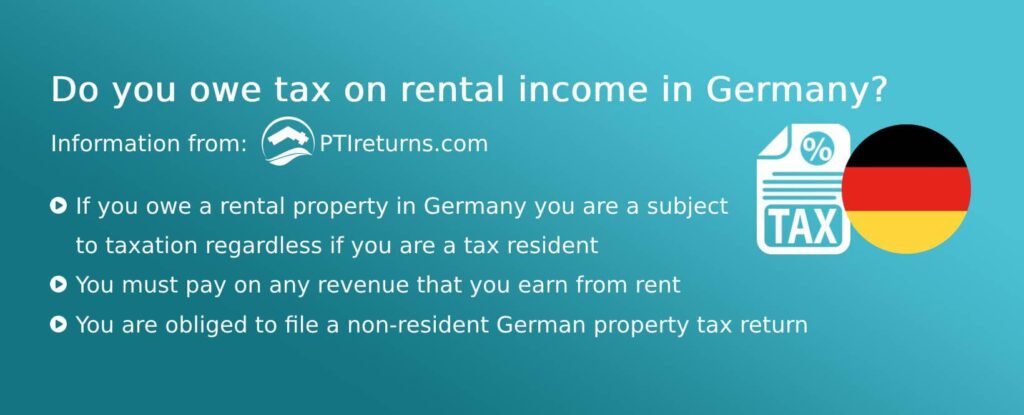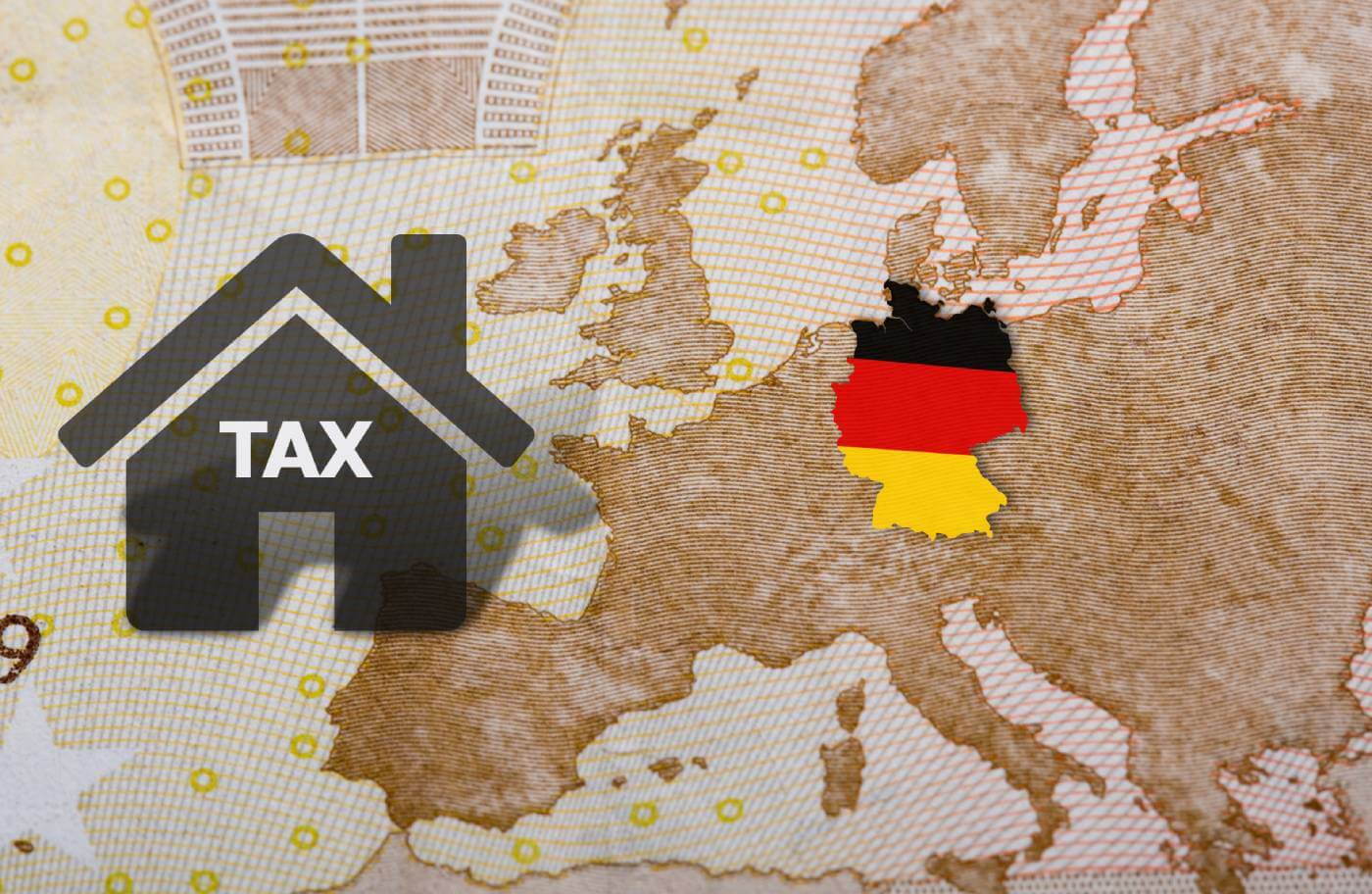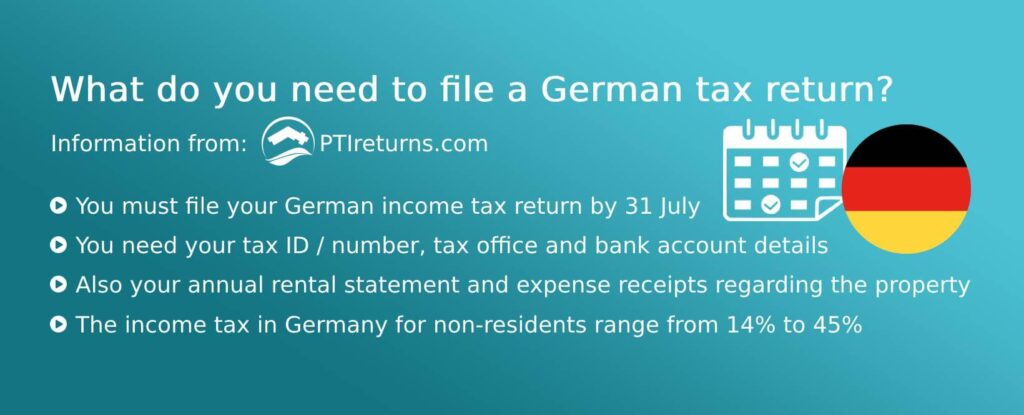Last Updated on September 28, 2025
As a non-resident German property owner, you are obliged to file a German tax return by 31 July of the year after you earned the income. If you use a tax advisor, the deadline is extended to February of the second following year. Non-residents are always taxable on German-source rental income and may face penalties for late or incomplete filing.
This guide covers:
- Property transfer tax, Grundsteuer, and rental income tax.
- Deductible expenses and tax allowances.
- Filing requirements, deadlines, and penalties.
- Capital gains tax when selling German property.
Taxes When Buying Property in Germany
When purchasing property, buyers must pay several upfront costs in addition to the purchase price.
Notary and Land Registration Fees
- Required by law, covering contract certification and land registry entry.
- Typically 1.5%–2% of the purchase price.
Real Estate Agent Fees in Germany
If you enlisted the assistance of a real estate agent to help you find a house in Germany, you may incur charges.
- Range: 3.5%–7% of the purchase price.
- Since December 2020, buyer and seller must split the fee equally.
Property transfer tax in Germany (also known as Grunderwerbsteuer)
Once the purchase process is completed, you will receive an invoice from the specific federal state (Bundesland) where the property is situated, asking for payment of a property transfer tax.
Rates vary by Bundesland:
| Income | Tax Rate |
|---|---|
| Bavaria | 3.5% |
| Baden-Württemberg, Bremen, Lower Saxony, Rhineland-Palatinate, and Saxony-Anhalt | 5% |
| Hamburg and Saxony | 5.5% |
| Berlin, Hesse, and Mecklenburg-Vorpommern | 6% |
| Brandenburg, North Rhine-Westphalia, Saarland, Schleswig-Holstein, and Thuringia | 6.5% |
Real property tax in Germany (Grundsteuer or Land tax)
- A local tax based on the assessed value (Einheitswert) × local coefficient.
- Rates typically 0.26%–1% but vary by region and property type.
- Paid quarterly to the local tax office (Finanzamt).
- Example: Berlin apartment ~€80–€150/year.
Real property tax in Germany (also called Grundsteuer, land tax or local property tax) is applied to real estate. It is a communal tax levied by the local authority in each region. Rates vary from location to location and are also based on the type of property.
Property taxes in Germany are determined by the assessed value of the property, which takes into account factors like location and size. All types of real estate, including undeveloped land, are subject to these taxes. The good news is that property tax rates in Germany are generally low, typically ranging from 0.26% to 1%.
However, the specific rate for a particular property will vary depending on the location, the type of property, and the value of the property.
The assessed value, also known as the “Einheitswert” in German, is usually lower than the market value of the property. To calculate the tax amount, the assessed value is multiplied by a location coefficient.
In former West Germany, this coefficient ranges from 2.6% to 6%, while former GDR regions have a coefficient of 5% to 10%. Finally, the resulting number is adjusted based on another coefficient specific to each state.
Fortunately, all the complex calculations lead to a favorable outcome – relatively low property tax amounts. For instance, if you own a typical apartment in Berlin, you can anticipate an annual tax payment ranging from 80 to 150 euros (approximately).
It’s important to note that this tax is calculated on an annual basis but is typically paid every three months to the local tax office, known as the Finanzamt. Keep in mind that property owners in Germany are required by law to fulfill their property tax obligations.
As of 2023, Germany is undergoing a transformation in its approach to determining local property tax rates, and these revised rates will be effective starting in 2025.
Financing property fees
- Closing costs (e.g. notary and transfer tax) cannot be financed via mortgage.
- Example: €400,000 property → approx. €60,000 extra fees.
- Possible support: KfW homeownership loan up to €50,000.
If you’re planning to take out a mortgage in Germany, it’s important to be aware that the closing costs associated with the property purchase are typically not financed by banks. Instead, you’ll need to cover these costs using your funds.
For example, let’s say you’re buying a property valued at 400,000 euros. On top of the purchase price, you can expect additional fees of around 60,000 euros. It’s important to note that these fees cannot be included in your mortgage amount.
Therefore, you’ll need to have at least 60,000 euros of your capital to cover these expenses. This doesn’t take into account the equity required as a down payment by your mortgage lender, which can range from 20% to 40% of the property’s value.
However, there is an option to apply for a KfW homeownership loan of up to 50,000 euros. This loan specifically helps cover closing costs like notary fees and property transfer tax.
KfW is the development bank of Germany – Kreditanstalt für Wiederaufbau.
Property assessment
- Required for properties worth over €500,000.
- Costs range from €100 to several thousand depending on method.
Additional Costs for Investors
- Moving expenses.
- Renovation/repairs.
- Furniture and furnishing.
Rental Income Tax for Non-Residents
Anyone earning rental income in Germany must file a German tax return, even as a non-resident.
- Taxed at progressive rates (14%–45%).
- Additional 5.5% solidarity surcharge.
- Non-residents always taxed on German income, even below allowance thresholds.
- Certain deductions allowed:
- Mortgage interest
- Depreciation (AfA)
- Maintenance & repairs
- Property management costs
- Insurance premiums
Special rule: If 90% of your worldwide income comes from Germany, you may access certain tax benefits.
Capital Gains Tax (CGT) on Property Sales
- 25% tax (plus surcharges) if property is sold within 10 years.
- Exemptions:
- If property is main residence for 2+ years.
- If held longer than 10 years.
- Spousal exemptions:
- Singles up to €250,000
- Married couples up to €500,000
If you sell a property in Germany that you’ve owned for less than 10 years, any profit you make will be subject to a 25% capital gains tax in Germany (known as Abgeltungssteuer).Additional charges may be added such as solidarity surcharge and, if relevant, church tax.
It’s important to note that buying property in Germany is often seen as a long-term commitment rather than a short-term investment in the housing market. This is particularly relevant if you plan to stay in Germany for a limited period.
The German capital gains tax rate is the same as the German personal income rate. Profits from the sale of private real estate that has been held for more than 10 years are exempt from German capital gains tax (CGT).
Income tax rates in Germany for foreigners
Income tax in Germany is figured out from what you earn, whether you work for someone else or are self-employed.
The income tax rates for non-residents in Germany are the same as the income tax rates for residents, and change based on how much you make.
Income Tax Rates in Germany (as of 2024):
| Income | Tax Rate |
|---|---|
| Less than €11,604 | 0% |
| €11,604 – €66,760 | 14% to 42% |
| €66,760 – €277,825 | 42% |
| More than €277,826+ | 45% |
*Note: Non-residents are always paying Income tax even if their income is below €11,604. This threshold is added to their profit.

Filing Requirements for Non-Residents
To file a German tax return, you need:
- German tax ID (Steuernummer).
- Details of your local tax office.
- German IBAN (for refunds or payments).
- Annual rental statement.
- Receipts for deductible expenses.
Filing Deadlines
- July 31 2025 without tax advisor.
- End of February 2026 with tax advisor.
Penalties and interest apply for missed deadlines.
Tax Allowances & Additional Taxes
- Basic allowance: €12,096 ({Update yearly}).
- Married couples allowance: €24,192 ({Update yearly}).
- Solidarity surcharge: 5.5% of income tax.
- Church tax: 8–9% (if registered).
Tax Office Letters (Bescheid) & Appeals
- The Finanzamt issues a Steuerbescheid (assessment notice).
- Common errors: 1 in 5–7 notices contain mistakes.
- You can appeal within 1 month via Elster or in writing.
- Missing deadlines may result in costly penalties.
How PTI Can Help
- 25+ years of expertise in international property tax.
- Over 322,000 tax returns filed last year.
- Support in multiple languages.
- Direct communication with German tax authorities.
- Assistance with appeals, deductions, and compliance.
FAQ

What are the taxes and fees associated with buying property in Germany?
Below is a quick overview of the taxes, costs, and fees incurred when you buy a property in Germany (often referred to as “closing fees” or “purchase fees”). Altogether, they amount to around 8% to 15% of the purchase price.
What is rental property income tax in Germany?
This is a levy you must pay on any revenue that you earn from rent (for example from renting a house, or an apartment, leasing immovable property, subletting a room in your apartment, etc.)
Residents are usually subject to taxation on their worldwide income, including rental income earned both in Germany and abroad.
Non-residents, on the other hand, are typically taxed on their income derived from German sources, including rental income from properties located in Germany.
How is rental income taxed in Germany?
If you rent an apartment or a house, you will have to pay in Germany tax on rental income.
Rental income in Germany is taxed by using a progressive scale method (from 14% to 45%) depending on the taxable base. The base is determined as the rental earnings are reduced by deducting allowable expenses and depreciation (such as building, fittings, and furniture).
However, keep in mind that non-residents are taxed differently than German residents.
A solidarity surcharge at a rate of 5.5% of income tax has to be paid on top of this. It is advised that non-resident married couples file their returns separately.
If you are a foreigner who owns property in Germany, our tax advisors can handle the tax filing process. If you have questions, you can request a no-obligation consultation with a tax expert.
What expenses can be deducted from income tax in Germany?
Tax deductions in Germany can be advantageous when renting out your property. The German tax system permits landlords to subtract expenses related to rental income, such as mortgage interest, repairs and maintenance, and others from the revenue earned through renting the property.
These deductions can be claimed through your yearly income tax return. If you have various income sources, seeking advice from a tax advisor for assistance with your declaration may be beneficial.
I have rental earnings from my German property, what are my tax obligations?
If you are a non-resident German property owner, you are obliged to file an income tax return both in your home country (where you are a resident) and in Germany.
Non-residents are subject to a personal levy on income derived from their German property. Due to double taxation agreements, you can avoid being taxed twice. PTI Returns can help you with this and with the rest of the paperwork.
Can property owners in Germany claim any tax allowances?
In Germany, everyone’s earnings are subject to a basic tax allowance. Up to this amount, your income is not subject to taxation.
The basic tax allowance in 2024 is €12,096 (€11,604 in 2024) if you are not married or in a civil partnership.
For couples who are married or in a civil partnership it is €24,192 in 2025. If your taxable income is higher than these amounts, you will pay income tax on it. Taxation rates vary from 14% to 45% as mentioned above.
In short, the higher your taxable income, the higher the rate of taxation will be.
The top rate of tax is 45%. This is only payable on earnings of more than €277,826 a year if you are unmarried.
Will I have to pay any additional taxes in Germany?
You are due to pay an additional solidarity surcharge of 5,5% (Solidaritätszuschlag) on top of your income tax liability. If you are a registered Church member, you may also be liable to pay a church tax of 8 – 9% on your income tax liability.
What happens if I don’t file my rental income tax return?
Failure to comply with the deadlines can result in fines and penalties.



